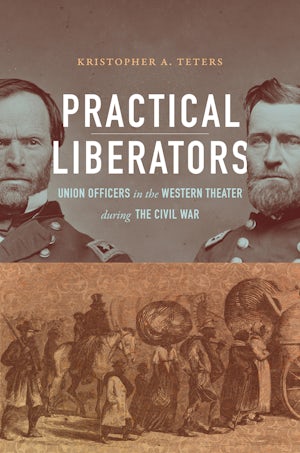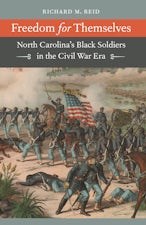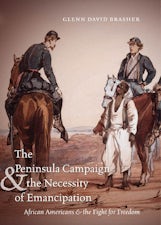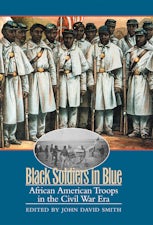Practical Liberators
Union Officers in the Western Theater during the Civil War
By Kristopher A. Teters
240 pp., 6.125 x 9.25, notes, bibl., index
-
Paperback ISBN: 978-1-4696-6882-6
Published: November 2021 -
Hardcover ISBN: 978-1-4696-3886-7
Published: June 2018 -
E-book PDF ISBN: 979-8-8908-4799-7
Published: April 2018 -
E-book EPUB ISBN: 978-1-4696-3887-4
Published: April 2018
Civil War America
Buy this Book
- Paperback $29.95
- Hardcover $32.95
- E-Book $19.99
For Professors:
Free E-Exam Copies
Through extensive research in the letters and diaries of western Union officers, Teters demonstrates how practical considerations drove both the attitudes and policies of Union officers regarding emancipation. Officers primarily embraced emancipation and the use of black soldiers because they believed both policies would help them win the war and save the Union, but their views on race actually changed very little. In the end, however, despite its practical bent, Teters argues, the Union army was instrumental in bringing freedom to the slaves.
About the Author
Kristopher A. Teters is a course faculty member at Western Governor's University.
For more information about Kristopher A. Teters, visit
the
Author
Page.
Reviews
"For anyone interested in the Civil War and how it advanced the cause of human freedom in this nation and the world will find this an essential addition to their library."--Ethan S. Rafuse, America's Civil War
“A much-needed and bracing look at how Union officers approached emancipation in the West during the Civil War”--Journal of the Civil War Era
“Teter’s sobering study of western officers’ lack of enthusiasm for emancipation as a moral issue helps explain how quickly the nation retreated from Reconstruction and the defense of black rights, even though the Civil War became a war of practical liberation.”--Journal of African American History
"Essential reading."--Civil War Books and Authors
“Teters’s book is anchored by thorough research and cogent analysis. . . . Practical Liberators deserves to be put into dialog with other works examining the evolving racial progressivism of the Union Army. It is a welcome addition to the Civil War’s ever-expanding literature.”--On Point
“Effective and well-written . . . accessible and valuable to broad and academic audiences alike.”--Journal of American History




